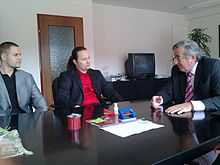Humaninstitut

The Humaninstitut is a scientific social-research institute, which was founded in 1986 by the clinical psychologist, sociologist and psychotherapist Dr. Franz Witzeling in Klagenfurt. Their project-partners are represented locally, nation-wide and international. The Humaninstitut works together with chambers, municipalities, the Carinthian government, the electricity-industry, council offices, ministries and international companies.
The main profession of the company is to combine Psychology and Sociology to create solutions in the sectors of human resource management, opinion- and market research as well as marketing and public relations. The so-called “VIVO Profiler” (former CMS), an online-test system developed by Humaninstitut for personal casting, coaching and consulting is now used since many years in cooperation with noted international enterprises for personal selection and team analysis.[1] The services and products can be described as social technique and human technology.
Research
During its research work the Humaninstitut cooperated with several internationally renowned scientists such as the communications theorist Paul Watzlawick, the austrian psychiatrist Erwin Ringel and the psychotherapists Bruno Bettelheim, Rudolf Ekstein and Ernst Federn, the son of Paul Federn, an important follower of Sigmund Freud. In this context different research projects and publications resulted.

Carinthian Soul
In September 1988 Dr. Franz Witzeling founded a symposium named “Kärntner Seele”. He invited Prof. Erwin Ringel, the author of the "Austrian Soul", one of the most discussed publications in Austria to analyze in the same way the soul of the country in the south of Austria, which is situated in the intersection of the three cultural circles of Austria, Slovenia and Italy. 1500 people came from Carinthia and the neighbor regions from the other side of the former borders before the EU accession of Slovenia and Austria. A documentation of this event was the result of a cooperation between Humaninstitut and the ORF, which can be seen on Carinthia TV.
Validation of the Diagnostic Screening System "VIVO Profiler"
The purpose of this study was to validate the psychological diagnostic screening system VIVO Profiler and in this context to examine differences between the three professions electrical engineer, merchandiser and care assistant in relation to the psychometric dimensions LQ (problem solving ability/reasoning), SQ (social competence) and EQ (emotional stability) measured by the psychological diagnostic screening system VIVO Profiler. In detail the study served as a tool to validate the psychological diagnostic screening system VIVO Profiler which is used in the selection of personnel. To reach the goal three kinds of methodical approaches were made. The convergent validity, the predictive validity as well as the concurrent validity of the VIVO Profiler were calculated. The whole validation was made with a sub-sample of the whole research sample. It was the sample of the electrical engineers with a sample size of n=191. The total sampling of this study came from selections of personnel which were made by the company “Humanistitut” for two carinthian companies. The total control sample contained N=535 participants (N=288 female, N=247 male).[2]
COMVIVO TV
In connection with the engagement in Social Networks the Humaninstitut has developed a scientific TV-Portal. The navigation follows the Humaninstitut's three key-dimensions: cognition, emotion and social perception. Just like their testing systems in Personnel selection registers the three elements: logical capability, emotional stability and social intelligence.[3] In this context also the website Carinthia TV emerged for the country of Carinthia.
Humaninstitut Vienna
The Humaninstitut Vienna was founded by the Psychologist Daniel Witzeling and the Social Researcher Fabio Witzeling in 2009. It's scientific focus lies on human resources development and political opinion research. The founders aim is to advance human and social science by involving the opportunities of social networks and new media.[4]
Media
The surveys and projects of the Humaninstitut are often orientated on current issues and therefore have a big media presence. For example in 2008 a survey about the Fritzl case, in respect of the topic of civil courage in Austria, attracted the attention of the international media.[5] In 2011 a study about the Vienna Opera Ball and Richard Lugners invitation of Karima El Mahroug (known in context of the reporting about the Prime Minister of Italy, Silvio Berlusconi) was cited in various media channels around the world as well as a study about the Austrian view on the Life Ball. The Humaninstitut as depth psychological oriented research institute investigated in several studies the opinion of the carinthian population in connection with the bilingual topographic signs.[6]
"A survey of 850 people prepared by Austria's Humaninstitut had 70 percent of respondents saying that - now that Ruby is in Vienna - we should welcome her with Austrian charm."
– Humaninstitut, cited by Forbes, International Herald Tribune, CBS, ABC, MSNBC, Fox News Channel, Bloomberg Businessweek, The Guardian etc.[7]
"According to a recent poll by the Humaninstitut in Klagenfurt, 69 percent of the population view the Life Ball as decadent, only 16 percent see it as a sign of tolerance."
- Humaninstitut, cited by Agence France-Presse, The Independent etc.[8]

References
- ↑ Website of the institute
- ↑ Validation of the VIVO Profiler on the University of Vienna
- ↑ TV-Portal
- ↑ Humaninstitut Vienna
- ↑ Survey about the Fritzl case with a list of citations
- ↑ Embassy of Tajikistan to Austria
- ↑ Study about the Vienna Opera Ball with a list of citations
- ↑ Study about the Life Ball with a list if citations